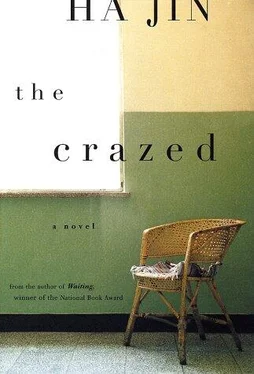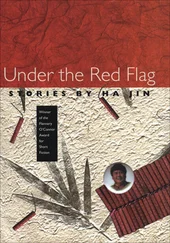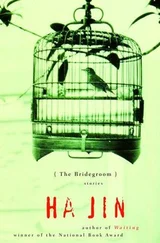“She has to go that far for water? Isn’t there a closer place?” I asked with a tremor in my voice.
“Nope. There’re two wells in Peach Village, but you can’t drink the water from them. It stinks like piss and can only be used for laundering and watering livestock. Folks have to go to Sweet Fount for good water.”
“If only I had known all this!” I said, hot with rage.
“Then what?”
“I might’ve bashed in that old bastard’s snout!” I meant the director’s.
“That wouldn’t help, wouldn’t change anything.” Hao licked his front teeth. His candid words, like a slap on my face, rendered me speechless.
A moment later I asked, “Have you folks ever sunk a well here?”
“Yes, but we don’t have a deep well, so we often run out of water in summer.”
“Why didn’t you sink a deep well?”
“We have no machinery.”
“Why not get some?”
“No money.”
His answers were so simple that they made me feel like a raging fool. I looked around and saw that indeed the entire area of six or seven villages had no electricity. Actually there weren’t enough trees on the hills whose trunks could be used as electrical poles.
Having taken leave of Hao, I walked back to Hanlong Town. The scorpion-stung boy still cried at the foot of the mountain, though no longer continuously. He wailed falteringly, now stopped awhile, now resumed. I fished the piece of black bun out of my bag and took a bite. It was bitter, sticky, and coarse, made of millet husks, acacia blossoms, and sweet-potato flour. It tasted like an herbal bolus, but I chewed on it. Nothing could abate the bitterness in my heart.
The morning after I returned from the countryside, I went to Secretary Peng’s office to deliver the letter and also to inform her that I had decided to go to the Policy Office at the Provincial Administration.
I had made up my mind to pursue an official career not because I fancied I could become a savior of the country people. No, I wasn’t that simpleminded. I just wanted to be a man more useful than a lightweight clerk — a scholar. If I had the power to distribute resources and funds, I would help children like the screaming boy stung by a scorpion and the downtrodden folks like those at Sandy Rock. There was work to do in this province, for which I was finally ready. My trip to the countryside made me realize that like myself, the poor villagers were also meat on the chopping board. Now I was determined to become a knife or an ax, so that someday I could cut down a few corrupt officials. In addition, this move was also a way for me to have a life different from my teacher’s. I wanted to live actively and meaningfully.
As I was about to knock at the door of Secretary Peng’s office, somebody shouted from inside, “You’ve tortured him ever since he’s been ill!” I recognized Mrs. Yang’s voice.
“No,” countered Ying Peng. “I’ve helped him all along. Anybody with good eyes can see how much I’ve done for him. You should be more grateful to me.”
“You helped him? By going to the hospital to blackmail him again and again?”
“Watch your tongue, Nanyan. Your words are wide of the mark.” She called Mrs. Yang by her first name.
“Didn’t you demand that he get a scholarship for your nephew?”
“Who told you that?”
“Never mind how I found out. You mean to torture him to death, don’t you?”
“Nanyan, how can you accuse me like I was a criminal? I tell you, he promised me to secure a scholarship for my nephew before he went to Canada last year.”
“No, he didn’t.”
“Of course he did.”
“Liar!”
“Listen, if he hadn’t promised me, I wouldn’t have granted him permission to visit Canada. Do you think he could’ve gotten the funding without my support? To put it bluntly, he owes me a scholarship.”
“You’re shameless.”
“Tell me, how much is shame worth? I’m a practical person, a dialectical materialist.”
“You’re like an animal.”
“At least I’ve never gone back on my word like what your husband did. I hate two kinds of people most: ingrates and promise breakers. He’s both.”
I tried to think of a case in which Ying Peng had failed to make good on her word, but I couldn’t recall one. Strangely enough, she did seem to have a clean record on that score.
The secretary spoke to Mrs. Yang again. “Heaven knows how much I’ve done for him and you.”
“For me?”
“Yes.”
“Like what?”
“I took steps to keep him from sinking deeper into an illicit affair with his student. Don’t you see that you’re a beneficiary of my effort too? I helped save your marriage. Shouldn’t you be more grateful to me?”
Silence ensued. At last I understood why Ying Peng had yoked Weiya to Yuman Tan — she meant to separate her from Mr. Yang so as to stop their relationship and protect our teacher and his reputation. In other words, she might indeed have intended to help him out of a troublesome situation, although at the same time she had used this knowledge to coerce him into working for her nephew. From her standpoint, her effort did constitute a huge favor, for she could have exposed him and turned him in anytime, but instead, she had the affair hushed up and dissolved within the department. Heavens, she would do anything to get the imagined scholarship. How ludicrous and convoluted this whole thing was! I was flabbergasted beyond words.
I knocked on the frosted glass on the door. “Come in,” called the secretary.
Both women were surprised to see me. Mrs. Yang’s face was dilated with emotion, her round eyes fierce and her chest heaving. Her hands, with the fingers interlaced, kept rubbing each other. I gave Ying Peng the envelope that contained the investigation letter and my application for the position at the Policy Office.
Then quietly I left the room without exchanging glances with Meimei’s mother, fearing Secretary Peng might suspect that it was I who had informed Mrs. Yang of the letter of recommendation and the scholarship. Yet in Ying Peng’s glowering eyes I detected some suspicion. In fact, I had never mentioned this matter to Mrs. Yang. The only person who could have provided her with the information was Banping. Or Mr. Yang himself in his delirium.
Because of the trip I hadn’t listened to the Voice of America. Mantao told me that some army units had attempted to enter Beijing City to clear the hunger-striking students out of Tiananmen Square, but they were blocked on the streets by the civilians. Although most of the soldiers were unarmed, tanks and artillery were assembling on the outskirts of the capital. I was disconcerted by the news, but I couldn’t imagine that the government would dare to unleash military force on the citizens and students, especially with so many foreign reporters still in Beijing, who had gone there for the Soviet leader Mikhail Gorbachev’s visit about two weeks before. Some undergraduates on campus were exasperated and restless, eager to leave for the capital to join forces with the students there. Mantao was considering if he should go with them.
Early that afternoon a phone call came from the hospital. With a sob Mrs. Yang said to me that my teacher’s condition had turned critical and I should come as soon as possible.
Hanging up, I hurried to the dormitory building to inform Weiya of this sudden development, but she was not in. Without further delay I set out for the hospital. It was said that recently Weiya went to paint in Yuman Tan’s apartment almost every afternoon, and that one of her paintings had been selected for an exhibition of works by young artists in the province. In my heart I still resented her getting so thick with that man in a time like this. Our teacher, her old inamorato, wasn’t dead yet, why couldn’t she wait a while? Bicycling townward, I couldn’t stop thinking about what Mrs. Yang had told me on the phone. That morning, when she was quarreling with Ying Peng in her office, my teacher had fallen out of bed and hit his head on the edge of the cabinet. After emergency treatment he came to, but he still had suffered a severe concussion and a cerebral hemorrhage.
Читать дальше

![Lao Zi - Dao De Jing [Tao Te Ching] (english)](/books/3890/lao-zi-dao-de-jing-tao-te-ching-english-thumb.webp)
![Lao Zi - Dao De Jing [Tao Te Ching] (chinese)](/books/3891/lao-zi-dao-de-jing-tao-te-ching-chinese-thumb.webp)
![Lao Zi - Dao De Jing [Tao Te Ching] (espanol)](/books/3892/lao-zi-dao-de-jing-tao-te-ching-espanol-thumb.webp)







